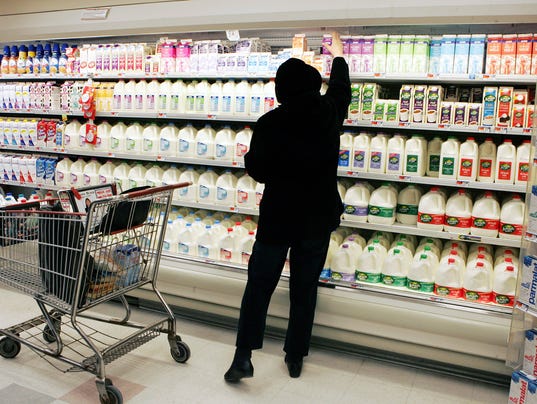
The National Milk Producers Federation, based in Arlington, Va., says food manufacturers are raising fears about of things like genetically modified organism products, synthetic animal-growth hormones and high fructose corn syrup.
In its “Peel Back the Label” campaign, the dairy industry trade group says nearly 70% of American consumers look to food labels when making purchase decisions, but that some of the information is misleading.
For instance, one company has labeled its table salt as “GMO-free,” when it could never have been GMO in the first place because salt has no genes to modify.
Similar marketing practices have taken place with dairy products, according to the National Milk Producers Federation, which says it represents about 70% of Wisconsin’s dairy farms through farm cooperatives and individual memberships.
Genetically engineered crops are safe for humans and animals to eat and have not caused increases in cancer, obesity, gastrointestinal illnesses, kidney disease, autism or allergies, a report finds. USA TODAY
“The deceptive labels and fear-based marketing increasingly used by some food manufacturers damages consumer trust and jeopardizes the safe, sustainable farming practices that have enhanced farm productivity over the last 20 years,” said Jim Mulhern, federation president.
“Consumers have a right to both truth and transparency in food labeling. We launched this campaign to help consumers peel back the label on deceptive food marketing in the name of profits,” Mulhern said.
The campaign’s website, peelbackthelabel.org, cites examples of what the federation calls fear-based food labels.
The website targets yogurt maker Dannon for advertising non-GMO ingredients. It also takes aim at Dean Foods for a “No GMOs” label on TruMoo chocolate milk.
“Our goal is to see brands step away from these tactics and to see them embrace a more honest and transparent way of talking about food production,” said Emily Meredith, chief of staff for the federation.
Dannon says it’s offering more products made without GMO ingredients and that the changes have been driven by consumer demand.
“We continue to be surprised that we are on the receiving end of criticism about our providing choices that consumers are looking for,” the company said in a statement.
It’s not that Dannon is necessarily opposed to GMO ingredients, said company spokesman Michael Neuwirth.
“But consumers can go to the store and make choices based on their preferences, not ours,” he said.
It’s disappointing to see the National Milk Producers Federation use dairy-farmer money to “blast companies selling dairy foods,” Dean Foods said in a statement.
“NMPF is doing harm, including to its own members, by attacking the No. 1 chocolate milk brand. An expensive campaign, website and press release attempting to spread incorrect information is an oddly aggressive way to voice concern to a company that supports farmers by buying and marketing … milk,” Dean Foods said.
The National Milk Producers Federation did not reveal its budget for the campaign, but Meredith said it was a “fairly hefty” amount of money being spent and that some cooperatives had pledged dollars “over and above” their normal membership dues.
“We are not letting up on this. It’s going to be something that we continue to push, and it’s something that our farmers feel strongly enough about to dedicate a significant number of resources,” Meredith said.
The Dairy Business Association, based in Green Bay, says it believes in having an “open and honest” discussion about how food is produced, but that some labels are misleading.
“It is understandable that food companies want to differentiate their products in the store. But purposely confusing customers, as some marketing campaigns do, is not right. The end doesn’t justify the means,” said Dairy Business Association spokesman Jamie Mara.
It’s a “slippery slope” when marketers attempt to push one type of milk over another based on how it was produced, said George Crave, president of Crave Brothers Farmstead Cheese in Waterloo.
“We are very proud in the dairy industry that we have a very clean label, and that’s ‘Grade-A milk.’ I don’t know how much cleaner it could get,” Crave said.
Genetically modified foods are derived from organisms whose genetic material (DNA) has been modified in a way that doesn’t occur naturally. Most genetically modified crops, sometimes called biotech crops, have been developed to improve yields through resistance to disease and insects.
Some of the marketing claims against GMOs are “frustrating” to deal with, said Nancy Kavazanjian, a grain farmer from Beaver Dam and former chairperson of the U.S. Farmers and Ranchers Alliance.
“And claims like ‘gluten-free water’ are just silly,” Kavazanjian said.
Still, consumers will vote with their spending based on what they’ve learned over the years, said Mark Kastel, co-founder of The Cornucopia Institute, a Wisconsin-based group that studies food policy issues.
It’s no coincidence that the growth in natural foods has soared as people have learned more about the use of biotechnology and chemicals in agriculture, Kastel said.
“It was the arrogance of the dairy industry, including the NMPF that fostered the launch and aggressive growth of organic milk,” Kastel said.
Source: USA Today









